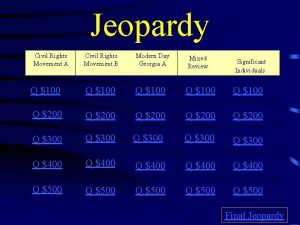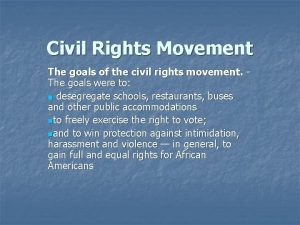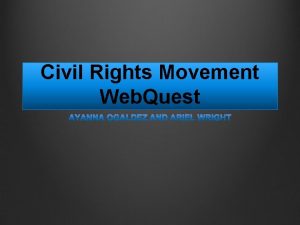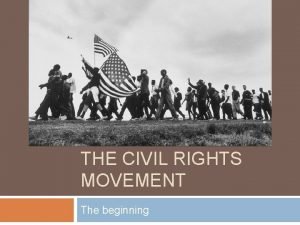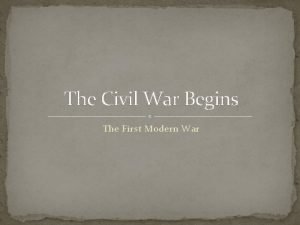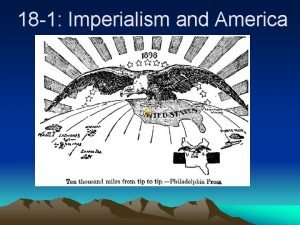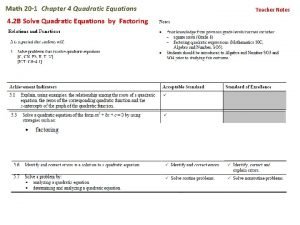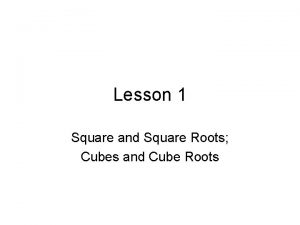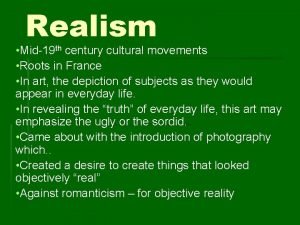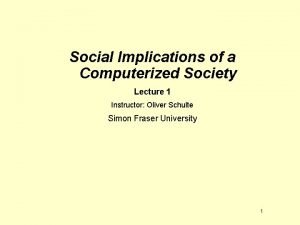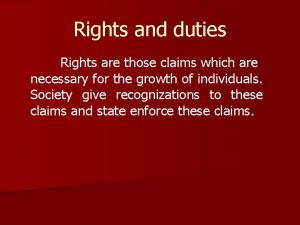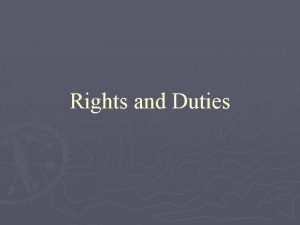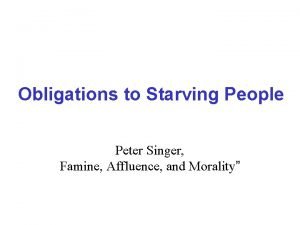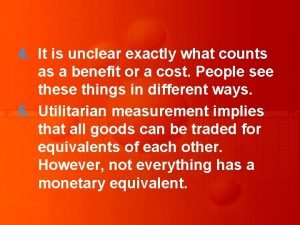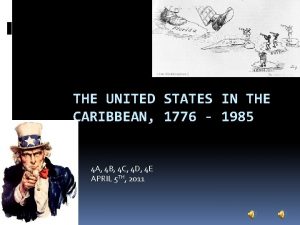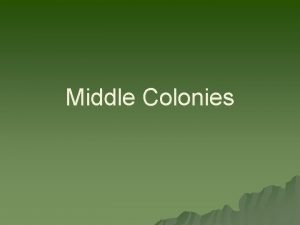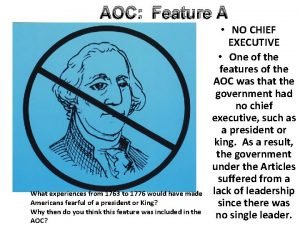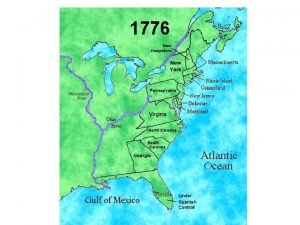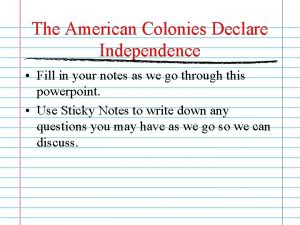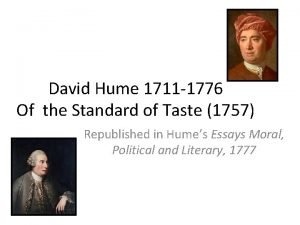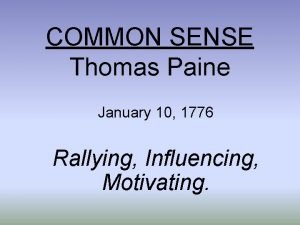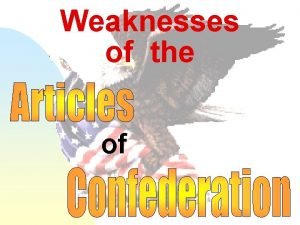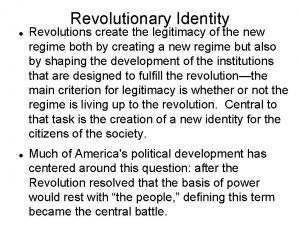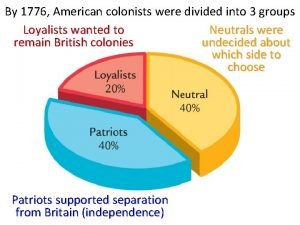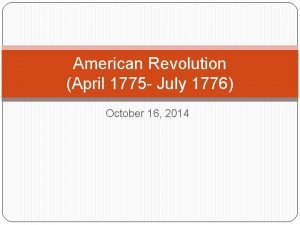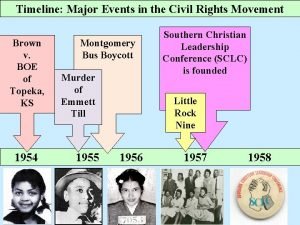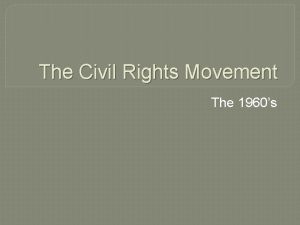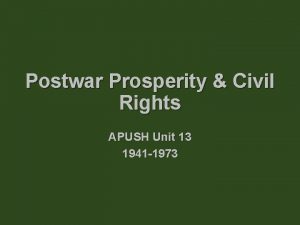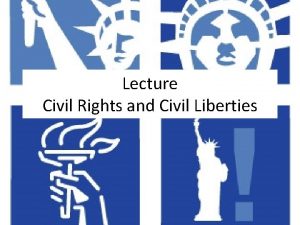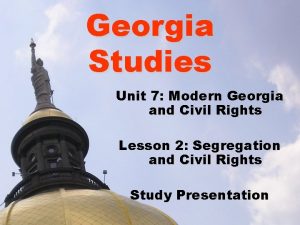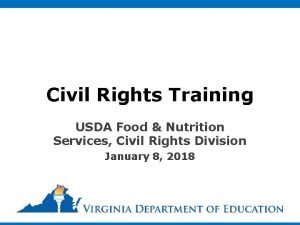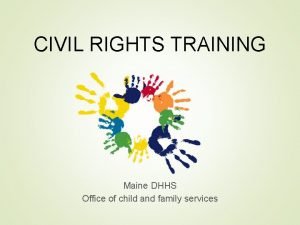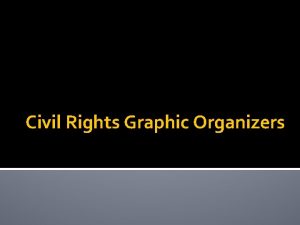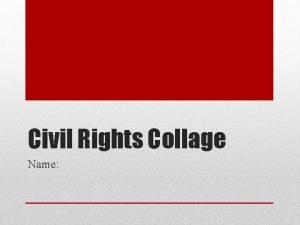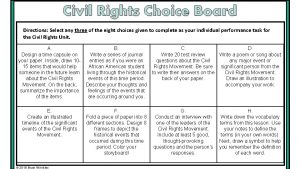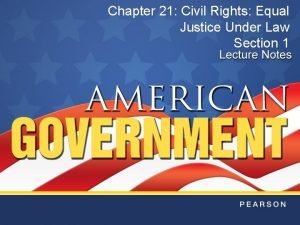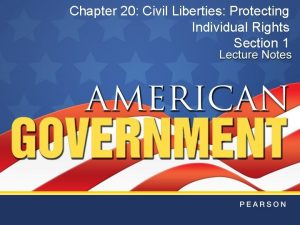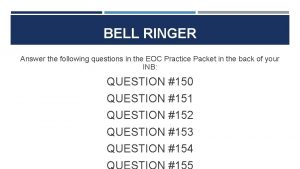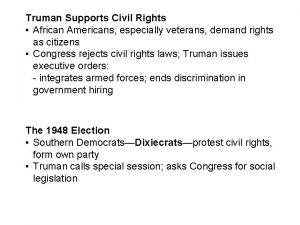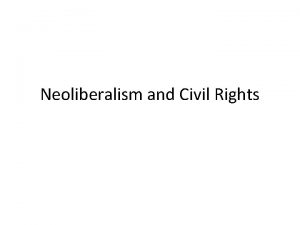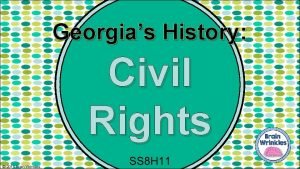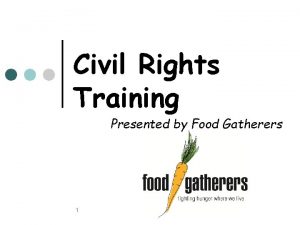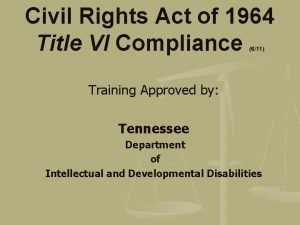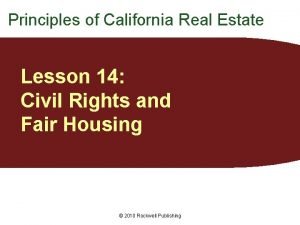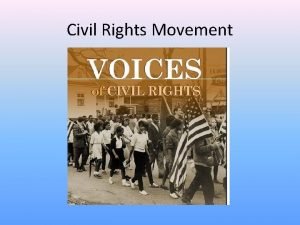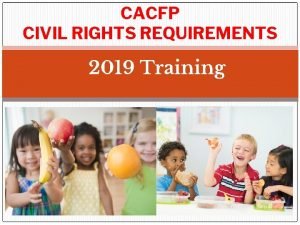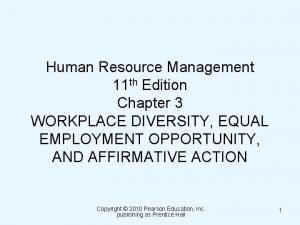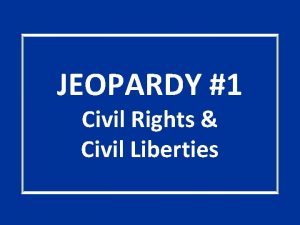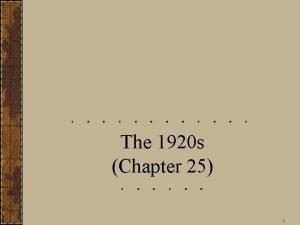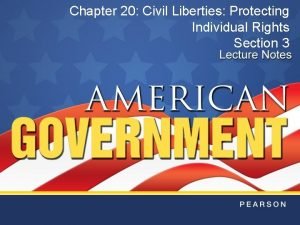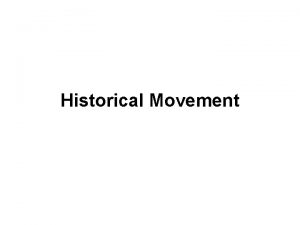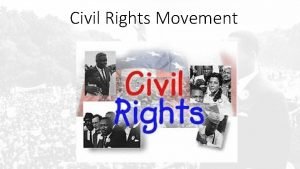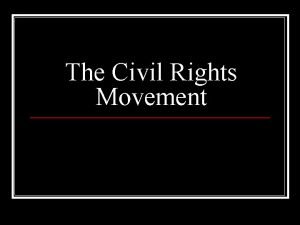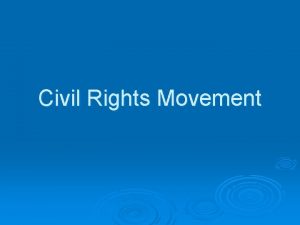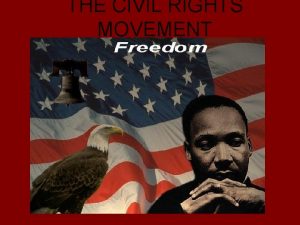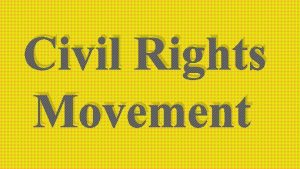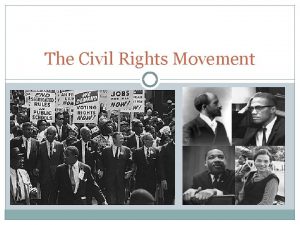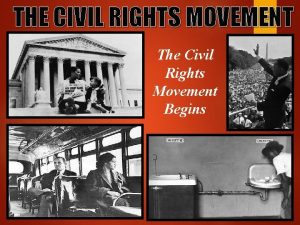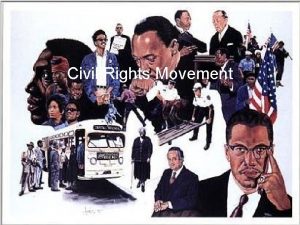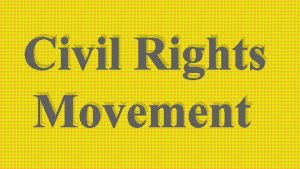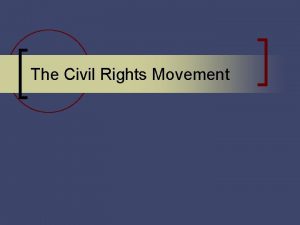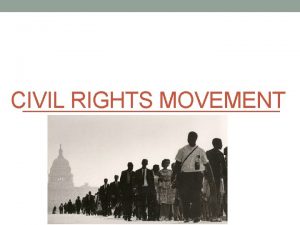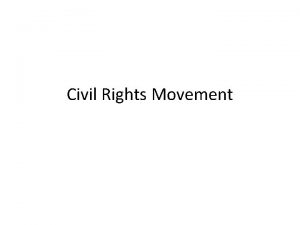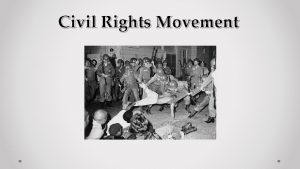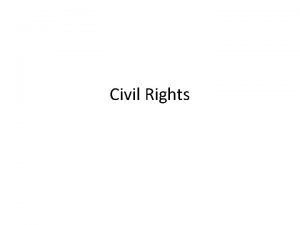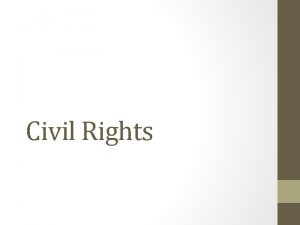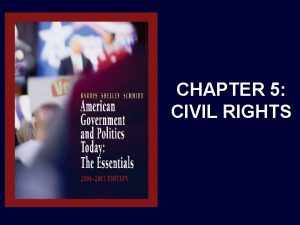Civil Rights Movement Historical Roots 1776 Civil War




































































- Slides: 68

Civil Rights Movement

Historical Roots • • • 1776 Civil War 13 th, 14 th, 15 th amendments World War II

Truman • “I’m not asking for social equality, because no such things exist, but I am asking for equality or opportunity for all human beings. ” • ’ 46 Truman appoints biracial committee on civil rights • They make many suggestions including a permanent committee • Congress fails to act

Changes Begin • ’ 48 - Truman bans discrimination in the hiring of federal workers • ’ 50 Korean war begins with a fully integrated army • Jackie Robinson- first African American in major league baseball. Huge social implications

NAACP • National Association for the Advancement of Colored People • Pushed for major civil rights legislation and helped organize many other groups involved in the movement – Norris v Alabama-blacks to be included on juries – Morgan v Virginia-segregation on busses – Sweat v Painter-Virginia-law schools have to admit African Americans

Other Organizations • National Urban League- devoted to help people who moved to urban areas • Congress of Racial Equality (CORE)committed to change through peaceful confrontation • Southern Christian Leadership Conference (SCLC)- introduced the idea of nonviolent protest

Other Organizations • Student Nonviolent Coordinating Committee (SNCC)- originally part of SCLS many thought that organization wasn’t doing enough to get young African Americans involved. • Headed by Bob Moses who would also become a key figure in the Civil Rights movement


Brown v Board • Overturns “separate but equal” established in Plessey v Ferguson • Brown says discrimination cannot be a factor in public services including schools • Also establishes the right of the national government to enforce this idea

Resistance to Brown “With all deliberate speed” –too vague Years before some states comply Massive resistance- the call for all segregationists to fight the ruling trough legal matters Southern Manifesto- 101 senators who vow to overturn the ruling

Bus Boycott • Rosa Parks- not the first to refuse to move • Women’s political Council (WPC) organizes a bus boycott • African American and a few white supporters stayed off buses for over a year • Kills the profits of the bus companies, they give in • MLK emerges as a leader in the civil rights movement at this point


Little Rock Nine • The governor (Faubus) uses the Arkansas national guard to turn away 9 black students from Arkansas Little Rock High School – Said he couldn’t keep order if he had to enforce integration • Eisenhower places the Arkansas National Guard under federal control – Force the troops to allow the student to enter and then protect them all year





Civil Rights act of 57 • Eisenhower thought desegregation should happen overtime, as attitudes change • Little Rock forced him to get involved, 1 st president since reconstruction to send military into the south to protect African Americans • The Act does very little but does attempt to bring executive authority to the situation

Sit-in Movement • A group (both black and white) would simply sit at segregated lunch counters. They would not move if asked. Usually they were arrested, often they were beaten. • Some 70, 000 eventually participate in sitins across the south



Freedom Rides • 1961 • Integration on interstate buses is still illegal • CORE & SNCC organize rides through the south by both white and black young people on the same buses • Met with tremendous fear, hate and violence



Integration at Ole Miss • 1962 • Supreme Court said he had been denied on racial ground and had to be admitted • James Meredith became the first black student to enroll at the University or Mississippi • Governor Ross Barnett blocked the door himself and would not let Meredith enter • Riots occur and Kennedy has to send troop to restore order





Clash in Birmingham • MLK lead an attempt to end segregation at stores and churches in Birmingham using marches and sit-ins – The police chief “Bull” Connor arrested King and others for marching without a permit • Some criticized King (mostly white) as causing problems from outside the community • King responds with “letter from the Birmingham jail”, defending his tactics and timing


Kennedy and Civil Rights • Kennedy took less action on civil rights than promised in ’ 60 • Lets the department of Justice (RFK) handle most matters in court system • Like Ike he is forced to send troops into the south to enforce national law and protect African Americans

Freedom Summer • 1964 thousands of students black and white head to the South to get people registered to vote – Many Southern Whites (KKK) are already mad about the victories of the civil rights movement, plan to intimidate the volunteers – Chaney, Goodwin, Schwerner- volunteers who go missing in Mississippi. Later found dead Mississippi refused to prosecute the accused • Many in the North and West now see the injustice and legal bias

Johnson and Civil Rights • The civil rights act of 1964 is pushed through the senate for 2 reasons • Johnson’s experience in the Senate • The memory of Kennedy • After the violence of the Selma march Johnson introduces the voting rights act of 65

Washington and Selma • Washington- 200, 000 people march in support of the 64 civil rights act • Selma- marches plan a 50 mile march to Birmingham. They don’t get out of the city before they are viciously beaten while not resisting, on national TV “bloody Sunday”




Success of the movement • • 1. 2. 3. 4. Johnson- uses the Kennedy assassination to his political advantages, pushes through legislation “Kennedy would have wanted” Civil Rights Act ’ 64 Bans different voter registration for races Prohibits discrimination in public accommodations Bans discrimination on the basis of race and sex EEOC- investigates job discrimination

Success of the movement • Voting Rights Act ’ 65 - Eliminates grandfather clauses and literacy tests • Gives federal officials the power to register voters when/where local authorities are blocking it • 1 year later 400, 000 African Americans were registered in the South

Success of the movement • 24 th Amendment (1964)- Barred the use of poll taxes in federal elections

Part III Shift in the movement

Malcolm X

Malcolm X • In jail he joins the Nation of Islam • Nation of Islam- preached black separation and self-help – Did not seek change through political means laughed at civil disobedience, non-violence and rejected integration

Malcolm X • Goes to Mecca and sees how Muslims of all races can get along – Returns willing to work with civil rights leaders and even whites on some issues • Shot and killed in Feb ’ 65 – Nation of Islam charged with the Murder

Black Power

2 views 1. Physical self defense even violence is acceptable in the fight for rights 2. African Americans should control the social political and economic direction of their struggle

Black Power • Stokely Carmichael- becomes leader in SNCC – Calls on workers to carry guns – Rejects white activists • Black power- a call for African Americans to unite, recognize heritage, build a sense of community and meet goals on their own

Black Panthers

Black Panthers • Political party that wants blacks to lead their own communities – Demand the federal government rebuild the nations ghettos to make up for years of neglect • “power flows from the barrel of a gun”-Mao • SNCC and Black Panthers move far away from the ideas/tactics of the NAACP

Watts



Riots in the Streets • De jure segregation • De facto segregation • Racial tensions explode (summer ’ 65) • Watts Riots (similar to R. King situation) • 6 days of riots leave 34 dead and over 1000 injured • (things are actually much worse in Detroit)

King Assassinated



4/4/68 • King was in Memphis to help striking sanitation workers • Shot and killed on the balcony of his hotel by James Earl Ray – Sparks anger and violence – Riots in 124 cities • For many this ends the idea of non-violent change

RFK Assassinated


6/5/68 • Robert Kennedy was see as the carrier of the “Kennedy legacy” • An ally of the poor and racial minorities • Seen as the last champion of the civil rights movement and the man who will end the Vietnam war • Wins California primary on 6/5/68 • Shot that same day by Saran

1968 Democratic Convention

’ 68 Democratic Convention • Thousands of protestors descend on Chicago. • They are angry about civil rights and Vietnam • The mayor (Daley) tells police to use force to end demonstrations outside the convention and in Lincoln park • The action inside is just as contested (Mc. Carthy v Humphrey) • The Media captured the chaos and violence • To many this was the end for the era of nonviolent protest and change

Other Movements 1. Women's movement (NOW, ERA) Civil Rights Act ‘ 64 2. Chicano Movement 3. Native American Movement All of these used the Civil Rights Movement as a template for change.

Success of the Movement • Segregation was now illegal in all aspects • Hundreds of thousands of African Americans were now registered to vote • EEOC*

Great Society • Johnson- declares a “war on poverty” • Great society- his vision of a perfect and equitable society the US could become • Main goals – economic equality – Equal opportunity • Major programs – Medicare/Medicaid – Head start

Chart on 736

Success? • Many programs still around • Have become entitlement budget items • Establishes the idea that government has some role in equality (but that isn’t always a happy thought) • Funds for programs get harder and harder to get (Vietnam is expensive)
 Civil rights webquest
Civil rights webquest Mother of the modern day civil rights movement
Mother of the modern day civil rights movement Civil rights movement jeopardy
Civil rights movement jeopardy Goals of the civil rights movement
Goals of the civil rights movement Civil rights movement vocabulary
Civil rights movement vocabulary Civil rights movement webquest
Civil rights movement webquest The civil rights movement
The civil rights movement Civil rights movement essential questions
Civil rights movement essential questions Civil war first modern war
Civil war first modern war Toward civil war lesson 3 secession and war
Toward civil war lesson 3 secession and war Vanessa jason biology roots answer key
Vanessa jason biology roots answer key Perfect square notes
Perfect square notes Existence and uniqueness of square roots and cube roots
Existence and uniqueness of square roots and cube roots Economic roots of american imperialism
Economic roots of american imperialism Quadratic equations roots
Quadratic equations roots All the perfect squares
All the perfect squares Meaning of human rights
Meaning of human rights Mid19
Mid19 Positive vs negative rights
Positive vs negative rights Littoral rights.
Littoral rights. Conclusion of rights
Conclusion of rights Legal rights and moral rights
Legal rights and moral rights What are negative rights
What are negative rights Negative rights
Negative rights Negative rights vs positive rights
Negative rights vs positive rights Negative right
Negative right The united states in the caribbean 1776-1985
The united states in the caribbean 1776-1985 Timeline of the middle colonies
Timeline of the middle colonies Ccc 1776
Ccc 1776 What experiences from 1763 to 1776
What experiences from 1763 to 1776 1776-1607
1776-1607 What is the significance of july 4 1776 brainpop
What is the significance of july 4 1776 brainpop Malcolm budd
Malcolm budd January 10th 1776
January 10th 1776 Nadja farshad
Nadja farshad July 12 1776
July 12 1776 1787-1776
1787-1776 1776 divided by 3
1776 divided by 3 July 16 1776
July 16 1776 Civil rights timeline of events
Civil rights timeline of events Civil rights sitins
Civil rights sitins Impressionism apush
Impressionism apush Define civil rights
Define civil rights Unit 7 modern ga and civil rights
Unit 7 modern ga and civil rights Usda civil rights training
Usda civil rights training Civil rights training child nutrition programs
Civil rights training child nutrition programs Civil rights in child nutrition programs
Civil rights in child nutrition programs Civil rights graphic organizer
Civil rights graphic organizer Civil rights leaders collage
Civil rights leaders collage Civil rights choice board
Civil rights choice board Chapter 21 civil rights equal justice under law
Chapter 21 civil rights equal justice under law Chapter 20 civil liberties protecting individual rights
Chapter 20 civil liberties protecting individual rights Civil rights bell ringers
Civil rights bell ringers Truman supports civil rights
Truman supports civil rights Characteristics of civil rights
Characteristics of civil rights Civil rights cloze notes 1
Civil rights cloze notes 1 Brain wrinkles answer key
Brain wrinkles answer key Federally protected classes
Federally protected classes Title vi of the civil rights act of 1964
Title vi of the civil rights act of 1964 Civil rights in child nutrition programs
Civil rights in child nutrition programs Unruh civil rights act real estate
Unruh civil rights act real estate Civil rights movment
Civil rights movment Cacfp civil rights
Cacfp civil rights Title vii of the civil rights act
Title vii of the civil rights act Title vii of the civil rights act
Title vii of the civil rights act Civil rights jeopardy
Civil rights jeopardy Chapter 14 postwar prosperity and civil rights
Chapter 14 postwar prosperity and civil rights What did the civil rights act of 1875 do
What did the civil rights act of 1875 do Chapter 20 civil liberties protecting individual rights
Chapter 20 civil liberties protecting individual rights


